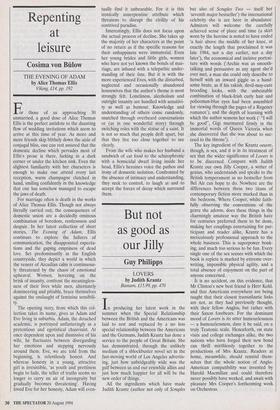Repenting at leisure
Cosima von Billow
THE EVENING OF ADAM by Alice Thomas Ellis Viking, £14, pp. 192 Fr those of us approaching 30 unmarried, a good dose of Alice Thomas Ellis is the perfect antidote to the daunting flow of wedding invitations which seem to arrive at this time of year. As more and more friends skip blithely down the aisle of conjugal bliss, one can rest assured that the domestic decline which pervades most of Ellis's prose is there, lurking in a dark corner or under the kitchen sink. Even the slightest familiarity with her characters is enough to make one attend every last reception, warm champagne clutched in hand, smiling confidently in the knowledge that one has somehow managed to escape the jaws of death.
For marriage often is death in the works of Alice Thomas Ellis. Though not always literally carried out, the consequences of domestic union are a decidedly ominous combination of boredom, restlessness and despair. In her latest collection of short stories, The Evening of Adam, Ellis continues to explore the failures of communication, the disappointed expecta- tions and the gaping emptiness of dead love. Set predominantly in the English countryside, they depict a world in which the veneer of Arcadian calm is continuous- ly threatened by the chaos of emotional upheaval. Women, hovering on the brink of insanity, confront the meaningless- ness of their lives while men, alternately domineering and pitiable, brace themselves against the onslaught of feminine sensibili- tY.
The opening story, from which this col- lection takes its name, gives us Adam and Eve living in suburbia. Adam, the detached academic, is portrayed unflatteringly as a pretentious and egotistical chauvinist. At once dependent upon and dismissive of his wife, he fluctuates between disregarding her emotions and stepping nervously around them. Eve, we are told from the beginning, is relentlessly honest. And whereas honesty in a young, attractive girl is irresistible, 'as youth and prettiness begin to fade, the teller of truths seems no longer to carry an air of incongruity but gradually becomes threatening'. Having loved Eve for her honesty, Adam will even- tually find it unbearable. For it is this ironically unserpentine attribute which threatens to disrupt the civility of his contrived paradise.
Interestingly, Ellis does not focus upon the actual process of decline. She takes up the majority of her characters at the point of no return as if the specific reasons for their unhappiness were immaterial. Even her young brides and little girls, women who have not yet known the bonds of mar- riage, are infused with a telepathic under- standing of their fate. But it is with the more experienced Eves, with the disturbed, neglected and occasionally abandoned housewives that the author's theme is most strongly felt. Loneliness, alcoholism and outright insanity are handled with sensitivi- ty as well as humour. Knowledge and understanding of others come randomly, snatched through overheard conversations or (as in one wonderful story) through switching roles with the statue of a saint. It is not so much that people drift apart, but that they live too close together to see clearly.
From the wife who makes her husband a sandwich of cat food to the schizophrenic with a homicidal dwarf living inside her head, Ellis's heroines voice the pathos and irony of domestic isolation. Confronted by the absence of intimacy and understanding, they seek to control, to laugh at and to accept the forces of decay which surround them.


















































 Previous page
Previous page